
Laney College student Diane Starr is currently pursuing her Machine Technology certificate. Machining, however, is not new to Starr. The two are getting reacquainted after a 29-year hiatus.
As a young woman in 1986, Starr entered the Navy and reluctantly accepted the assignment of machinist. She had scored in the highest percentile on certain sections of the aptitude test indicating Starr would make an ideal machinist. Having never worked as a machinist, she didn’t know what it entailed, so she was unsure about the work but finally accepted the offer.
Starr prevailed at the top of her class and was deployed to the Persian Gulf on a non-combatant repair ship. Her best-in-class ranking superseded that of her colleague, who had been working as a machinist on a ship prior to his training.
“The competition between us was tough, and it motivated me,” she said. Starr knew she was talented, but she also knew she was under much more scrutiny than her male counterparts. Yet, at the end of her training course, Starr succeeded in holding the highest rank in her machining class, and she said that her strongest competitor “didn’t like that one bit.”
Starr spent five years working in a variety of positions on the non-combatant repair ship while it was stationed outside of a combat zone near the Persian Gulf. She said being one of a few women in the machine shop meant it was a constant effort to prove her value.
“But once my team saw my talent, it was no longer questioned and I was accepted,” she said.
Starr said she was skilled enough to be tasked with handling and machining the nuclear machinery, for which she wore a yellow hazmat suit.
She handled repair of nuclear propulsion systems through a closed-glove bag. It was dangerous work. Although it had the potential to be life threatening, Starr said her time in nuclear repair was exciting.
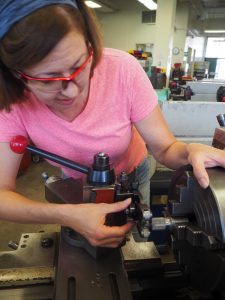
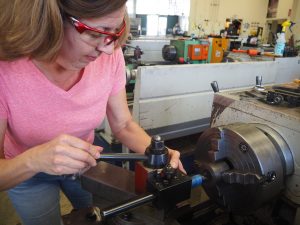
Starr said she also faced down sexism in the workplace. She’d entered into the Navy, which had only integrated women at sea on combat ships just 26 years ago, and trained in a trade dominated by men. She said a high-ranking Navy man asked her to be his mistress. He was a married man and wanted an at-sea girlfriend. He offered her privileges and gifts in exchange.
“I was horrified,” she said. When she immediately rejected him, there was a backlash from her superior officer.
“He made my life more difficult than it needed to be for two years.”
Starr said she preferred to leave the details to the past.
After five years in the Navy, Starr earned an honorable discharge, and she was hopeful as she entered into civilian life as a highly-skilled tradeswoman. She donned her best business casual attire and went to get a job as a machinist.
Starr said she was surprised that, upon entering a machine shop, she had difficulty getting the management’s attention. In the few instances when she was able to have a conversation with the shop owners, she felt aggressively questioned, unwelcome and under suspicion.
“I guess they just couldn’t believe that a woman in a clean outfit, and well-groomed, could machine as well as they could,” she said.
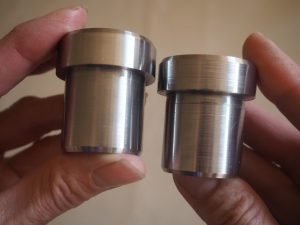
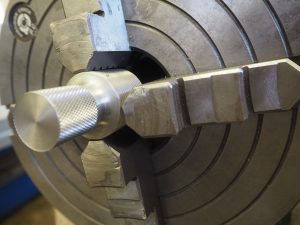
During the presentation Starr gave about her experience at the Women in Manufacturing Skilled Trades Symposium on Feb 21st, she noted that she was underprepared to navigate unions and the path to becoming a civilian machinist. Not one shop gave her a chance to demonstrate her skills or apply for a position.
More than once, men would tell her: “Show me your hands.” Though many were not shop employees, she found most men were in disbelief that she was a machinist. She assumed this meant that they doubted the veracity of her skill because her hands weren’t oily and dirty enough. Starr said she always explained to them she regularly cleans her hands and that is no measure of anyone’s skill. It’s true, even today, her hands are elegant, adept and extremely clean.
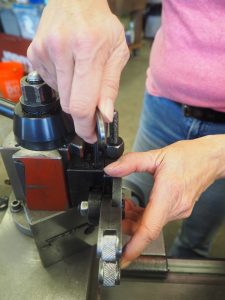
Starr felt defeated. She took an office job doing administrative work and remained there for the next 25 years. She said she painfully missed machining “the entire time.”
Then, in 2016, crisis struck. Starr’s husband of 15 years died suddenly, and as one does after such a great loss, she assessed her life’s path. She said she also needed to increase her income if she wanted to remain in the Bay Area. She decided it was time to return to her passion – machining.
“It’s like being an artist,” Starr said–when she is machining, she loses track of time and finds the flow. The smell of the oil, and the feel of the lathe and mill, still beckoned.
Starr found the trades much friendlier to women this time around, almost thirty years later. The job market had evolved, and women were encouraged to apply for jobs that in the past had been typically held by men.
Starr found support in her search during a job fair when a representative from the East Bay Municipal Utility District (EBMUD), suggested she would increase her chances of being hired if she rounded out her skills by taking welding classes and completing her machining certificate. Starr followed the advice and enrolled in classes at Laney College.
“I had no idea Laney had these classes. This is perfect!” she recalled thinking to herself. At last she felt welcomed and excited to get back into the shop. She credits her instructors with creating a professional, inclusive and supportive environment.
Starr will pursue full time work as a machinist upon completion of her internship and certificate. While at Laney, she has refreshed her current knowledge, increased her precision skills, and added to her experience with new technologies. Starr said she is confident she will soon earn a livable wage and not need to relocate outside of the Bay Area. She is both thrilled and relieved, as are her two snakes, two cats and fish.

Starr presented as a guest speaker on a panel at the Women in Manufacturing Skilled Trades Symposium on February 21st. The event, the first of its kind in the Bay Area, began a dialogue about diversity, equity and inclusion in the skilled trades. Starr spoke powerfully about wanting to help inspire others to make changes in their lives.
She and many other women shared stories about their experiences in the skilled trades, and all agreed that while some progress has been made in the trades, complicated and critical work has just begun. Machine Technology class for details.

























